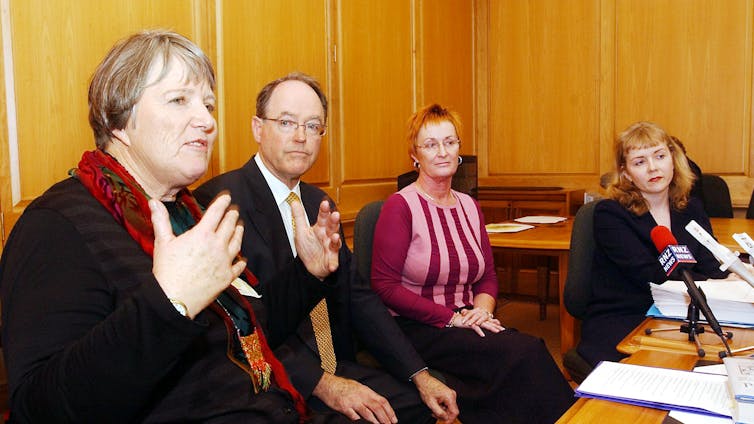By allowing the Peter Ellis appeal to continue, the Supreme Court recognises the right to justice outlives the individual
- Written by Kris Gledhill, Professor of Law, Auckland University of Technology
Whether or not Peter Ellis’s appeal against his remaining child abuse convictions from the Civic Creche case is successful, the fact it can be heard at all is significant.
The Supreme Court decision announced today not only opens the door for the first substantive criminal appeal after someone has died, it also points to a gap in our Criminal Cases Review Commission, the recently established body designed to deal with miscarriages of justice.
The Supreme Court won’t reveal its reasoning until its decision on the appeal, but one of the arguments in favour of the appeal continuing was based on the notion under tikanga Māori (traditional rules and tenets) that a person’s mana (prestige, authority) continues after death, and extends to their wider whānau/family.
At the same time, recognition of the importance of correcting judicial errors comes in the form of an ancient royal power. The prerogative of mercy allowed the monarch to interfere with criminal convictions and sentences by granting a pardon.
This clearly applied to people who were dead, necessarily so because the error might in the past have led to execution. A famous example of this involved Derek Bentley, who was executed in England in 1953 and pardoned in 1993.
The long road of appeal
In New Zealand the governor-general has the prerogative of mercy. In addition to this monarchical power, section 406 of the Crimes Act 1961 allows them to refer convictions or sentences back to the appeal court.
This is the route Ellis embarked on some time ago. His original conviction on 16 charges dates back to 1993. An appeal in 1994 was successful on three charges but unsuccessful on the other 13. A second appeal was heard after a reference by the governor-general, but this was dismissed in 1999.
Another application was made under section 406. This led to a judicial inquiry but no reference back to the Court of Appeal.
So, the most recent court decision is the one from 1999. The date of the convictions and appeals means the case could technically have been appealed to the Privy Council in London (as happened in Teina Pora’s case). However, Ellis’s lawyers went to New Zealand’s Supreme Court instead. The court granted Ellis permission to appeal further in July 2019.
The question at the centre of that appeal was whether a miscarriage of justice occurred in light of all the evidence now to hand.
 Author Lynley Hood, then-MP Don Brash, former creche supervisor Gaye Davidson and then-MP Katherine Rich after a petition was presented at Parliament in 2003 calling for a royal commission into the Christchurch Civic Creche child abuse case.
GettyImages
Author Lynley Hood, then-MP Don Brash, former creche supervisor Gaye Davidson and then-MP Katherine Rich after a petition was presented at Parliament in 2003 calling for a royal commission into the Christchurch Civic Creche child abuse case.
GettyImages
The place of tikanga Māori in law
But then Ellis died and the argument began over whether the appeal should be allowed to continue.
This was heard in two parts – first in late 2019 and then at the hearing in June 2020 when the role of tikanga was argued in detail.
We will eventually find out what our most senior judges concluded about this significant matter. But it should not be controversial that the common law – the law made by judges – reflects the society in which it operates and not just the society in which it originated (England).
In fact, the Supreme Court has already recognised a role for tikanga in a very different context: decisions about who has the right to decide where a body should be buried. Recognition of a wider role for tikanga could be an important step in ensuring our law is suited for our circumstances.
Reputation matters even after death
The decision to establish the Criminal Cases Review Commission in 2019 recognised the importance of a more systematic approach to investigating possible miscarriages of justice. It was a welcome change, reversing the position of previous governments, but eligibility is limited to living persons or someone they have authorised.
A few other countries already have such a commission. Derek Bentley’s murder conviction was eventually overturned in 1998 after the equivalent body in England and Wales referred his case back to their Court of Appeal. Indeed, its first reference was the case of Mahmoud Mattan, the last man to be hanged in Wales, but who should never have been convicted.
These cases illustrate the importance of recognising that wrongs might have been done to people who have died. Allowing appeal courts to correct the record and remove the stigma is important for the reputation of the person. This continues after death.
The governor-general’s powers will remain, but our Criminal Cases Review Commission should have the power to consider applications on behalf of those no longer living. Parliament needs to consider this issue.
The Supreme Court’s finding that the Ellis appeal should continue confirms this is an important value in our legal system.
Authors: Kris Gledhill, Professor of Law, Auckland University of Technology




